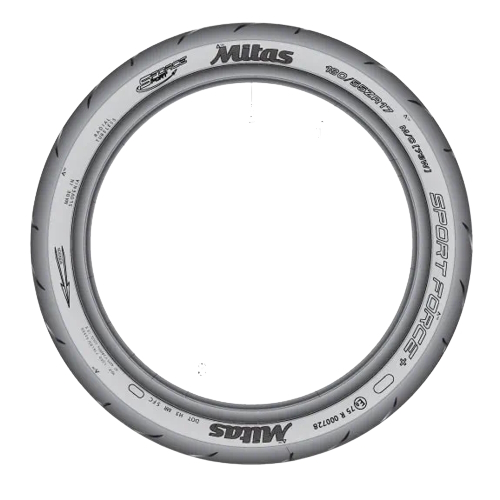
Home > general information > Tips and Guides > Technical guides > 50 Scooter >
HOW TO CHOOSE THE TIRES FOR YOUR SCOOTER?
The condition of your scooter's tires is not very good and you need to change them? You do not know how to choose your tires and you are afraid of not making the right choice?
To help you achieve this, we therefore offer you this guide in which we suggest you discover these different criteria in order to help you make the right choice.
Scooter tire: specificities
Par the nature of the scooter which favors the position of the comfort of the lower limbs and the "relaxed" driving, the tire of this vehicle has the following particularities:
- the profile of a motorcycle tire, with a rounded tread;
- a dimension generally smaller than that of a motorcycle tyre, to free up space for the rider;
- the presence of two tire options, radial or diagonal (although the radial tire is the most widespread today, as for the automobile).
You will find on 50factory.com all information about the size and identification of the different tires.
scooter tire sizes
First of all, it is important to check that the tire size you choose fits your scooter perfectly. In this case, the easiest way is to use the size listed on your old tires. It consists of three numbers. The first corresponds to the width of the tire while the second indicates, in percentage, the ratio between the height of the sidewall and the width of the tire. Finally, the third indicates what the inside diameter of the tire is. Each time you buy new tires you must therefore ensure that you always keep the same dimensions.
À​ note: the rim dimension for a scooter from 50 to 125 cm³ will be on average 10 to 14 inches, except for the equipment for maxi-scooters (from 250 to 1200 cm³) approaching the motorcycle dimensions (from 14 to 17 inches).
scooter tire marking
The tire also has other mandatory or optional markings.
Other mandatory markings include:
- the brand of the manufacturer;
- the commercial model of the tire;
- the European approval number;
- the coding indicating the place and date of manufacture;
- the maximum pressure recommended in bar and/or PSI (1 bar = 14,5 PSI);
- the indication “tubeless” for tubeless tires or “tube type” for tires with inner tubes;
- the wear indicator housed in the groove of the tire indicating the permissible wear limit (1,6 mm max).
Finally, the optional markings are as follows:​
- the direction of fitting (arrow) if the tire has one;
- the particularity of the tire, par example, M+S i.e. Mud + Snow (mud + snow).
Please note: the dimensions of the tires must correspond in all respects to the markings provided for par the constructor. However, differences are acceptable insofar as they reveal characteristics superior to the original: higher load index; higher speed index; superior tire characteristic (example: reinforced tyre).

The other factors of choice
- Your environment
Where do you plan to use your scooter? 100% urban, 50% country roads?
- Weather conditions
Of course, a regularly snowy region is not suitable for a scooter. But, if you live in a so-called rainy region, pay attention to tires offering good grip on wet roads.
- Your vehicle, its power and its use
- Soft or hard rubber?
Related to the type of tire you choose, the compound will define the characteristics of your tire. If the rubber is soft, you will enjoy better grip. However, your tire will then be much more fragile and will deteriorate much more quickly. A hard compound tire will provide less grip, but it will also allow you to cover many more kilometres. The dual-compound tire is the perfect intermediary between the two other types of tyre. The hard rubber of the central part gives it a good lifespan while the soft rubber located on its sides gives it excellent grip in turns.
Please note: the longevity of a tire is an important criterion; if we can count on a replacement every 20 000 km for a "dry" tire (count 20% less for a tire with soft rubber), the riding style has a great influence on this wear (sporty driving may be born cease replacement frequency x 2). For the majority of users with wiser and more occasional driving, the time factor is an important element: from 4 years of age, the natural aging of materials requires replacement.















